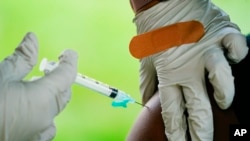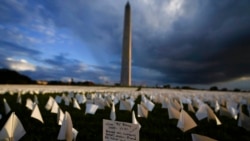A U.S. government advisory panel rejected a plan Friday for the widespread use of COVID-19 vaccine booster shots, dealing a setback to President Joe Biden’s administration, which had championed extra shots for nearly all Americans.
By a vote of 16-2, a Food and Drug Administration vaccine advisory panel rejected the widespread use of boosters, citing a lack of data on their safety as well as a lack of evidence concerning their value.
The independent panel did endorse extra vaccine doses for people who are 65 and older or at high risk of severe illness.
Drugmaker Pfizer had requested full approval for boosters for people 16 and older, a proposal backed by the Biden administration.
The White House announced last month that Americans who received either the Pfizer or Moderna vaccines could get a booster shot eight months after their second dose.
Earlier on Friday, the White House said it was ready to roll out the booster shots if health officials approved them.
Pfizer submitted data to the FDA this week that it said shows that the efficacy of its vaccine diminishes by about 6% every two months following the second dose, making a booster at the six-month mark safe and effective at strengthening protection against the virus that causes COVID-19.
Research has shown that although immunity levels decrease over time in those vaccinated, the Pfizer vaccine still provides strong protection against severe illness and death, even in delta variant cases.
The FDA panel's recommendation is not binding; the FDA is not required to follow the panel's recommendations, but it generally does.
Next week, an independent advisory panel for the Centers for Disease Control and Prevention will weigh in on who should get a booster and when.
Meanwhile, media reports say Biden is expected next week at the U.N. General Assembly to urge countries to pledge resources to vaccinate 70% of the world by next September. According to the World Health Organization, that would require about 11 billion doses. Moreover, the effort could still run into supply bottlenecks. Pfizer points to obstacles offshore in vaccine packing, distribution and cold storage.
However, Pfizer CEO Albert Bourla said in an open letter that the company is “continuing to work around the clock so we can bring the vaccine to the world as quickly, efficiently and equitably as possible.”
In June, the U.S. purchased 500 million doses to be distributed by Covax, the WHO-backed initiative, for low- and middle-income countries. As of August, the U.S. government had donated 110 million doses overseas. The Washington Post reports that the Biden administration is expected to announce next week it has bought another 500 million doses of the Pfizer vaccine to donate.
That has done little to satisfy critics, such as Amnesty International, which says Western countries are “hoarding” vaccines for their own populations.
The WHO says that of the 5.7 billion vaccine doses so far administered globally, 73% have been administered in just 10 countries. High-income countries have administered 61 times as many doses per inhabitant as low-income countries, according to WHO.
Johns Hopkins Coronavirus Resource Center said early Saturday it had recorded more than 227 million global COVID cases and 4.7 million deaths.
In Australia Saturday, police in Melbourne clashed with anti-lockdown protesters and arrested more than 200 people.
American Samoa reported its first COVID case on Friday. The infected person, a resident of the U.S. territory, had returned home from Hawaii on Monday, the first day commercial flights were allowed to resume operation from Honolulu to Pago Pago since March.
The Associated Press reports the infected traveler was “fully vaccinated” and had “tested negative for COVID-19 before boarding the flight back to American Samoa.”
India’s health ministry reported more than 35,000 new COVID-19 cases Saturday and 281 deaths.
Over 660,000 white flags have been installed on the National Mall in Washington to commemorate the people in the U.S. who have died from COVID. “In America. How could this happen” is the name of artist Suzanne Brennan Firstenberg’s installation.
The artist will “ceremoniously add” new flags every day to keep up with the COVID death toll, according to her website. The installation was mounted Friday and will last until October 3. There are benches among the flags, allowing “visitors to sit in quiet reflection.”
Johns Hopkins reports there have been more than 672,000 COVID-related U.S. deaths.
Some information for this report came from the Associated Press.





